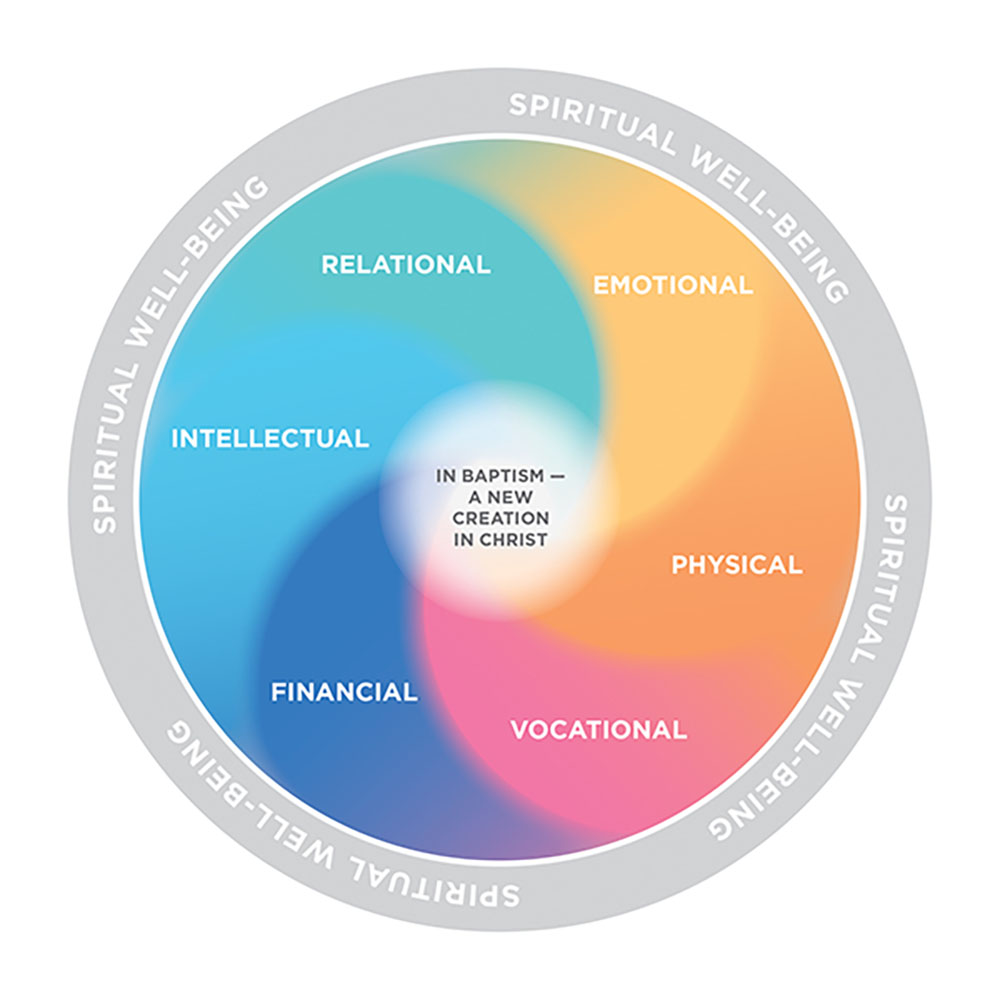Editor’s Note: This new series from LCMS Church Worker Wellness is hosted here on The Lutheran Witness site. Visit the “Ministry Features” page for regular Worker Wellness content.
As Lutherans, we understand that the various aspects of our wellness — intellectual, emotional, relational, physical, financial and vocational — relate to and depend upon one another, and are all rooted in our Baptism, our true identity as new creations in Christ. We understand spiritual well-being not as a facet of our wellness, but as fundamental to any and all facets of wellness for a Christian.
The following reflection, written by Deaconess Dr. Tiffany Manor, explores the theology of intellectual well-being.

God has created everything that exists, including human emotional capacity (Gen. 2:7; Isaiah 42:5; John 1:3; Col. 1:16; SC, First Article of the Creed). While it may be uncommon to find the word “emotion” in some translations of the Bible or historical Christian writings, the word “heart” is used frequently in Scripture as well as the Lutheran Confessions to describe emotion and the seat of our feelings. There are hundreds of emotive “heart” phrases in the Bible, as well as the Lutheran Confessions, along the lines of “glad heart,” “grieved heart,” “hardened heart,” “stirred heart,” “lift up your heart” and “merry heart.” Emotional well-being is not a new concept but has been discussed throughout time in Holy Scripture, in the writings of the Church Fathers and in the Lutheran Confessions.
Emotional wellness is experiencing a wide spectrum of emotions, having the ability to be aware of our feelings, both positive and negative, as well as managing the impact of our emotions on our behavior and actions (Eccl. 3; Rom. 12:15; Eph. 4:26–27; SD II 68). The goal of emotional wellness is not to be happy all of the time. Jesus Christ, even as the perfect, sinless man, was not happy or cheerful at every moment. We have multiple scriptural accounts of our Savior experiencing a wide variety of emotions (Matt. 9:36; John 15:10–11; Matt. 23:33; John 2:13–17; John 11:33–35).
Our emotions enrich our lives, our relationships with people and our interaction with God’s creation. Jesus celebrated with His neighbors at the wedding in Cana (John 2:1–12). He was sad when thinking about the people of Jerusalem (Luke 19:41–44). When Lazarus died, Christ mourned His friend and showed compassion to Martha (John 11:1–44). Following Christ’s resurrection He was joyful with His friends many times (Matt. 28; Mark 16; Luke 24; John 21). Our emotions will change from day to day, from moment to moment. Our Lord understands our emotions and has experienced a full spectrum of emotions Himself, yet without sin (Heb. 4:15).
Our reactions and feelings are among the inner physical workings of our bodies. Some of these are voluntary and at the forefront of our conscious thoughts, but emotions may be involuntary at times and are not necessarily always a conscious choice we make. Being aware of the emotions we are experiencing, being able to name them, giving an appropriate level of attention to our emotional state and working to keep our emotions from leading us into sinful actions and behaviors, are all vital skills in order to be emotionally well. It is also vital to recognize and confess sinful emotions and actions.
Forgiveness is important to our emotional well-being and is needed repeatedly throughout our lives, and by the Holy Spirit we are empowered to receive it. When God converts us, He redeems and begins the transformation of every part of our lives including our hearts (Rom. 12:2; Ap IV 46; SD II 70). Our sinful nature seeks to separate us from God, the law written on our hearts shows us how far we are from God and we can experience terror, guilt, shame, despair and more (SA III 2). In the Christian life our hearts are strengthened through our Baptism, the Lord’s Supper and God’s Word assuring forgiveness and life everlasting. Even if we don’t always feel transformed, the Bible assures us that we are transformed from the moment of our Baptism, and God continuously transforms us through His Word.
We need to understand and deal with the impact other people’s emotions have on us. The positive emotions of those around us can increase our own joy. At other times our neighbor’s emotions could become overwhelming. Resilience, being able to deal with other’s emotions, needs to be developed by having appropriate boundaries. As Christians we bear one another’s burdens (Gal. 6:2) and have compassion and empathy for one another. Yet our ability to bear burdens has limits, while our Lord’s is infinite. Our emotional burdens are made lighter by the great burden bearer, Jesus Christ (Matt. 11:28–30).
It is crucial that we not mistake very real illnesses that can cause emotional distress, such as depression and anxiety, as issues that can be solved by things we do. We cannot solve clinical depression or anxiety by increasing our trust or faith, or by praying more. While these are powerful spiritual resources in resisting the terrors of mental illness and distress, there are other resources that God has provided for healing and bringing balance to brain chemistry. Much damage has been and can be done by oversimplifying and presuming that emotional distress can be solved on our own. It can be harmful to misapply Scripture verses with the hope of cheering someone up or helping them to “snap out” of stress, melancholy or worries. Our Lord deals gently with us (Isaiah 42:3; Matt. 12:20). May we do the same as we point one another to sources of help and healing.
God provides many resources to those who are struggling with emotional well-being. He gives brothers and sisters in Christ to provide consolation and companionship (1 Sam. 16:14–23; 17:10–11). He gives us church workers and teachers who listen, pray and share His Word with us. He provides clinical professionals such as medical doctors, psychologists and therapists. He gives the great blessing of pastors who bring the comfort of God’s Word and Sacraments, including peace to troubled consciences through the gift of personal absolution. Through all of these means, the Lord is at work. His Spirit is “another Helper” who always intercedes for God’s beloved children (Rom. 8:26–30; John 14:16).
When we are experiencing emotional wellness we have a greater sense of optimism, grounded in eternity, and a realistic outlook on life. We can more easily enjoy the life that God our Creator has given us. For the believer, the real comfort is that Christ is with us in every emotion we experience (Psalm 139:8). We belong to our Triune God regardless of our feelings, because He claimed and made us His own in our Baptism (Psalm 73:26; 100:3). Through His Spirit and by His gifts, He is continually strengthening us, protecting us and filling us with hope (Psalm 121; Rom. 5; 8:18–30; 15:4, 13; SD XI).
Suggested Reading:
- Bradberry, Travis. Emotional Intelligence 2.0. San Diego: TalentSmart, 2009.
- Burns, Bob, Tasha Chapman and Donald Guthrie. Resilient Ministry. Downers Grove: InterVarsity Press, 2013.
- Gibbs, Jeffrey. “OK, So It’s Not Righteous…But What Do I Do with My Anger?” Concordia Journal 44:4 (2018): 51–56.
- Peperkorn, Todd. I Trust When Dark My Road: A Lutheran View of Depression. St. Louis: LCMS World Relief and Human Care, 2009. Peperkorn, Todd. I Trust When Dark My Road: A Lutheran View of Depression. St. Louis: LCMS World Relief and Human Care, 2009.
This theological reflection first appeared in the 2021 booklet “A Lutheran Perspective on Well-Being” (LCMS).
In the coming months, you will hear more about the work of LCMS Church Worker Wellness initiative, including new resources and more. Stay tuned to Reporter, The Lutheran Witness and the LCMS Church Worker Wellness site for updates.






Also of fundamental importance to emotional well-being is a sense of purpose. As God forgives, he does not leave us adrift in the world. Rather, he graciously gives us purpose and direction, equipping us to declare and demonstrate his mercies — and to find joy and fulfillment in doing so. As Scripture (in the ESV) says:
• Jesus said, “These things I have spoken to you, that my joy may be in you, and that your joy may be full.” – John 15:11
• [Christ] died for all, that those who live might no longer live for themselves but for him who for their sake died and was raised. – 2 Cor. 5:15
• [Jesus] gave himself for us to redeem us from all lawlessness and to purify for himself a people for his own possession who are zealous for good works. – Titus 2:14
• For we are his workmanship, created in Christ Jesus for good works, which God prepared beforehand, that we should walk in them. – Eph. 2:10
• But you are a chosen race, a royal priesthood, a holy nation, a people for his own possession, that you may proclaim the excellencies of him who called you out of darkness into his marvelous light. – 1 Peter 2:9
• Therefore, as you received Christ Jesus the Lord, so walk in him, rooted and built up in him and established in the faith, just as you were taught, abounding in thanksgiving. – Col. 2:6-7